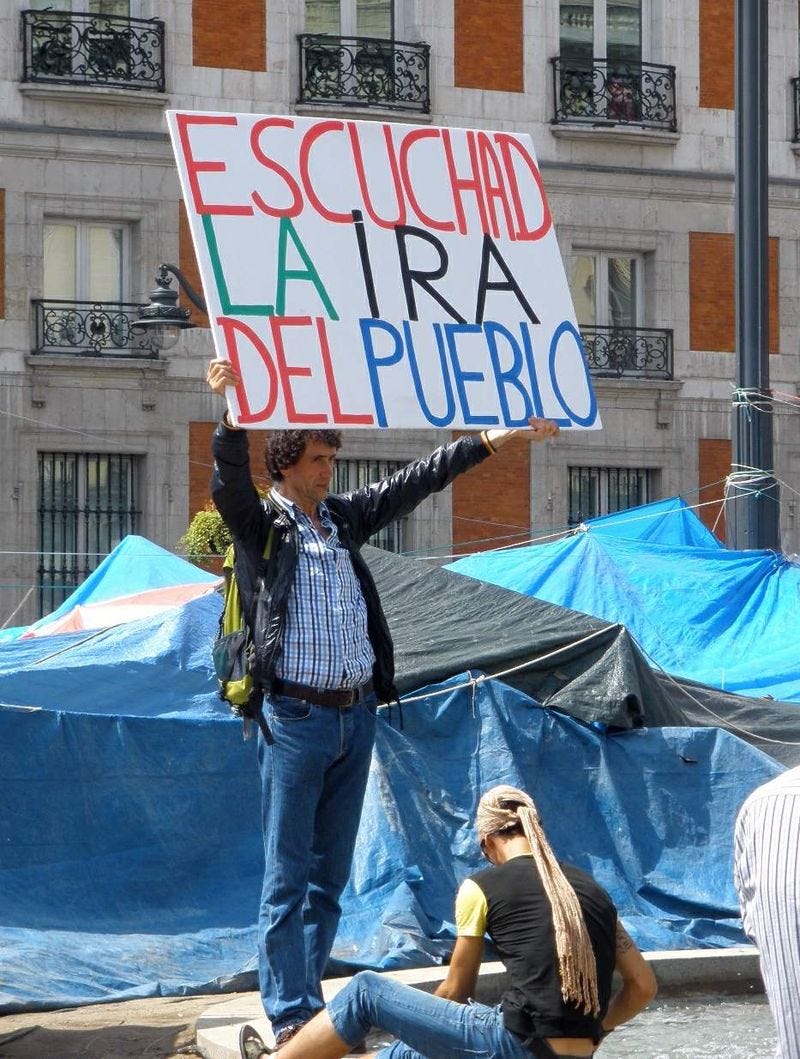Explaining what the Spanish Podemos/Sumar party is
Explaining what the "woke" Spanish party is to Richard Hanania
I’m a more or less regular follower of Richard Hanania. I think his posts and tweets are usually insightful, interesting, and yes sometimes a bit overtly provocative.
So when I saw his tweet about the recent Spanish general elections a few days ago I was reminded of what I think is the understandable difficulty of Americans and English speakers in general to grasp the politics of Spanish speaking countries.
Since politics in Spain for the last 8 years has been heavily influenced by the founding of the Podemos party and the reactions to its appearance in the political scene, I decided to send a short email to Richard with my attempt at explaining what Podemos is and what it’s not.
To my delight Richard replied to my email and even answered my undisguised attempt at seeking approval (“maybe I should publish in my substack“) with a “yes, you should publish that”.
So, without further ado, here’s the improved, a bit expanded and edited version of my email to Richard.
I’m not sure you understand the nature of the “new” left wing Spanish parties, in particular Podemos. And it’s difficult to explain their nature without mentioning Pablo Iglesias.
Iglesias is the founder of Podemos (in December 2014), the main party in the political alliance now called Sumar, together with a trotskyist by the name of Miguel Urbán who studied history but never graduated, a Sociologist by the name of Jorge Moruno who has worked as a call center operator, touristic “information guy”, grocery stocker, researcher, clerk, and digital media worker, and Íñigo Errejón who is a political science major who did three study abroad experiences while working towards his PhD (took him 6 years).
Iglesias is no slouch when it comes to beefing his resume with many degrees and many job experiences: 7 degrees including a PhD in political science and work as radio broadcaster, talk show guest, script writer, actor, and in television. You can check the whole resume here:
https://web.archive.org/web/20141030234532/http://sindominio.net/~pablo/trabajos/cv_08.pdf
The only reason Iglesias became the head of Podemos (2014 - 2021) is because he was much better known than his co-founders due to his media exposure, and I guess he’s more telegenic. If you don’t believe that last part, you can check for yourself by watching these short TV segments he did for the Spanish language Iranian (state) TV channel HispanTV (warning: they might take a very very long time to load… Iranian internet is a bit slow…):
https://www.hispantv.com/showprogram/fort-apache/106
Maybe due to his charisma, or maybe because Spanish people were tired of the old political parties, Podemos was a big success in the European Parliament elections of 2014, the first for the party, where they got five out of the 54 Spanish EU MPs. Besides Iglesias himself, the other four MPs are: an Arabic language graduate, another political science graduate, a lawyer who after 17 days left his MP post to another pol sci graduate, and an actual physics PhD. Yes, an actual bona fide physics PhD who did research at a university. But the Sumar alliance kicked him out on this last election together with a lawyer. I guess they really like their pol sci graduates.
I could go on and on, but I guess you already get the picture.
I’ll just add this in case there’s any doubt about what these politicians would be doing with their lives if they were not in politics (translated from Spanish Wikipedia on Lola Sánchez):
After finishing college she gets a “certificate in pedagogic aptitude“ from Murcia University in order to teach high school. She passed the oposiciones (civil service examination) twice although didn’t get a position. Worked as a vocational training technical teacher in several high schools around Murcia Region. Enrolled in post graduate courses of Spanish as a foreign language (UNED, Cervantes Institute) and institutional relations and protocol (La Rioja University).
In 2008 she traveled to Iceland, where she spends several months working in a sheep farm. At the start of the school year she moved to Reykjavik to teach Spanish in an Icelandic primary school.
After returning to Spain and working in a variety of jobs, she opened a traditional crafts store in Cartagena, which she eventually closed in 2012.
In 2013 she emigrated again, this time to Houston (US) where she worked illegally for several months. Faced with the difficulties of getting a work visa she returns to Cartagena, where she continues working as a waitress until the 2014 European Parliament elections and her taking office as MP.
Does that look like elite overproduction to you? The difference between “elite” overproduction in Spain - and also Latin America, but I don’t want to get into that now - and “elite” overproduction in the anglo-saxon world is that over here these over educated and very unproductive people have not just overrun every HR department, university administration office, and even government department they can get into, but have also successfully branched off into politics.
And they’ve had success in politics because they are their own customers. 35% of the population of Spain between the ages of 25 and 64 have attained some tertiary education degree. This is higher than Germany (27%), Slovenia (29%), the Czech Republic (22%) , France (32%) and Italy (17%), all countries with higher income per capita (PPP) than Spain.
If you had a pretty useless psychology or sociology degree, and maybe a couple of post graduate degrees on top of that, and still can’t find a stable job that will pay what you, well educated you, think you are worth after years of trying, wouldn’t you vote for Podemos/Sumar ? They understand your anger.
And those voters are a large part of the voting population. People who studied the following subjects make up 21.8% of total degrees awarded in Spain in the academic year 2021-2022:
Journalism
Psychology
Media studies
Philology and language
Behavior sciences
Social work
Arts
Humanities
And that proportion is growing. For the academic year 2017-2018, that’s just 4 years ago, those 8 subjects comprised 19.8% of awarded degrees.
If at least 40% of the working age population gets a university degree, as it seems likely to happen in 10 or 20 years, and close to a quarter of those graduates have a degree in one of the subjects listed above, then it’s no wonder that so many people in Spain can’t find a job that meets their expectations and will react by blaming the system and voting for Podemos. This is going to continue for decades, at least.
And why hasn’t this happened in culturally and economically similar countries like Italy and Portugal ?
In the case of Portugal it did happen, but with much less success than in Spain probably because only 22% of the working age population has attained an university degree and because the Portuguese party was really a small old style left party who opportunistically co-opted the angst of these voters.
And in the case of Italy, like I mentioned before only 17% of the working age population has an university degree. They kind of tried, but no luck.
This is the reason why these parties have no ideology, besides complaining about the system. If 6th wave feminism loses its appeal, they'll adopt 7th wave feminism. Whatever the latest social fashion that their frustrated, underemployed, over educated voters adopt, they'll adopt as party “ideology”.
And I’m using the plural parties because I’m also thinking of several Latin American parties which have a very similar profile to Podemos: Pacto Histórico (the Colombian coallition that brought Gustavo Petro to power), Revolución Democrática (Chile), Frente Amplio (Costa Rica).
I’m not saying that Spain is “exporting” this political and social phenomenon to Latin America. But I believe culture is pretty close to people, very persistent and long lasting, and it seems only natural that given the same conditions (over education, underemployment, etc…) in some Latin American countries the same phenomenon would happen in those Latin American countries.
On the other hand, José Merino del Río who is the founder of Frente Amplio in Costa Rica is actually a Spanish born pol sci graduate with studies in journalism and a master in Sociology.
This is the part of the article where I’m supposed to tell you to please subscribe if you liked it, but before doing that a few words about this blog (or newsletter?).
This is not a political newsletter, and I don’t intend on it becoming such a newsletter. The focus of this very young blog is on data based analysis of whatever gets my attention, being the movie industry, renewable energy, trends on the difussion of Covid-19, to name a few subjects I’ve written about. In fact, I plan to avoid politics as much as possible, so please don’t consider this article as an endorsement or censure of Podemos.
I do intend to write more on Latin American history in the future and that is part of the reason why I thought it might be interesting to write about this phenomenon.
With that out of the way, please subscribe you do feel the urge to do so :)



